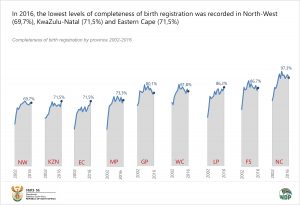Progress in birth registration levels in SA
South Africa has made strides in terms of registration of births. The results of a report, Estimating the completeness of birth registration in South Africa, 2002–2016, indicates that the number of registered births were high and on an increasing trajectory. There has been a significant increase in the number of children registered within the first two years after birth. The patterns indicating completeness demonstrate progress in birth registration, evident through increasing levels over time and the registration of late entries in subsequent years.
Results show that the completeness level has been increasing within the first annual calendar period from 2002 (55%) to 2016 (77,4%). Also, completeness has been increasing with the lag years from within one year to within five years of registration.
Northern Cape had the highest level of completeness across all the provinces from 2002–2016, with the exception of Free State in 2004. The second-highest level of completeness was reported in the Free State with a completeness level between 63,1% (2002) and 86,7% (2016). The pattern for 2016 revealed that the lowest levels of completeness was in North-West (69,7%), Eastern Cape and KwaZulu-Natal (71,5%). Over time, the Eastern Cape consistently reported the lowest completeness of registration, with the exception of KZN in 2004, 2005, and 2015.
A primary importance of complete birth registrations lies in the establishment of legal identity. A birth certificate, obtained through registration, is often the first legal document a person receives. It serves as proof of identity and citizenship, facilitating access to essential services such as education, healthcare, and social welfare programs. Without a birth certificate, individuals may face difficulties in asserting their rights and accessing government services.
Moreover, complete birth registrations contribute to the formulation of effective public policies and programs. Accurate demographic data derived from birth registrations help governments plan for future infrastructure, healthcare, and education needs. By understanding population dynamics, authorities can allocate resources efficiently and address disparities in service delivery across regions or demographic groups.
Additionally, birth registration plays a crucial role in safeguarding children’s rights and protection. Registration ensures that children are recognised under the law, reducing the risk of statelessness, child trafficking, and exploitation. It enables authorities to monitor child welfare, track immunization coverage, and respond promptly to instances of child labour or abuse.
Furthermore, complete birth registrations support statistical analysis and research initiatives. Demographers rely on accurate birth data to study population growth, fertility rates, and migration patterns. These insights inform academic studies, economic forecasts, and epidemiological research, aiding in the development of evidence-based policies and interventions.
Completeness in birth registrations is indispensable for upholding effective governance and fostering socio-economic development. Governments and stakeholders must prioritise efforts to ensure universal birth registration coverage to realize these benefits fully and build inclusive and resilient societies.
It must be recognised that the process of estimating the completeness of births registration is challenging, particularly for South Africa. One reason is that in the case of birth completeness the denominator, which should be the true number of births, is debatable. Different estimates of true births, derived from sources such as censuses, surveys or through application of models, differ by a significant margin. Therefore, the purpose of the study was to estimate completeness of birth registration using different indirect estimation methods which is not well-documented.
For more information download the full report here.


